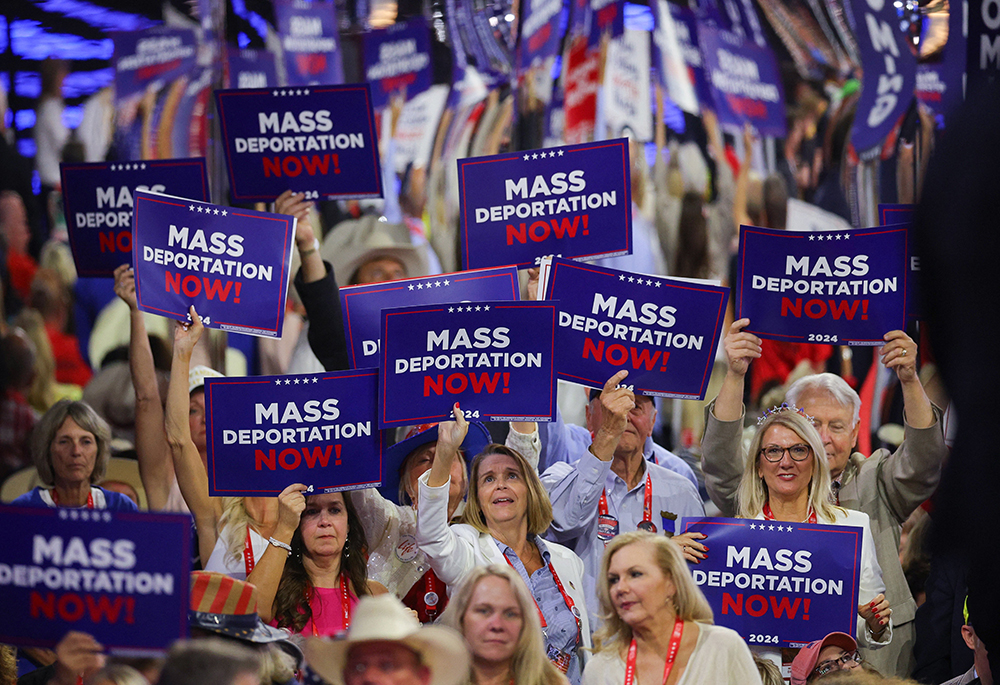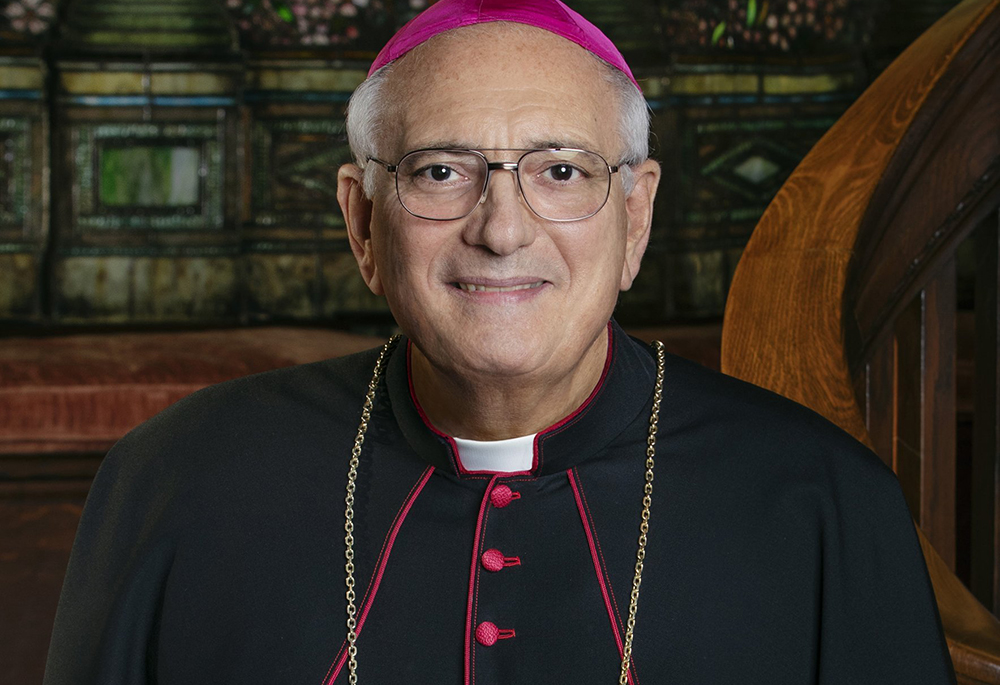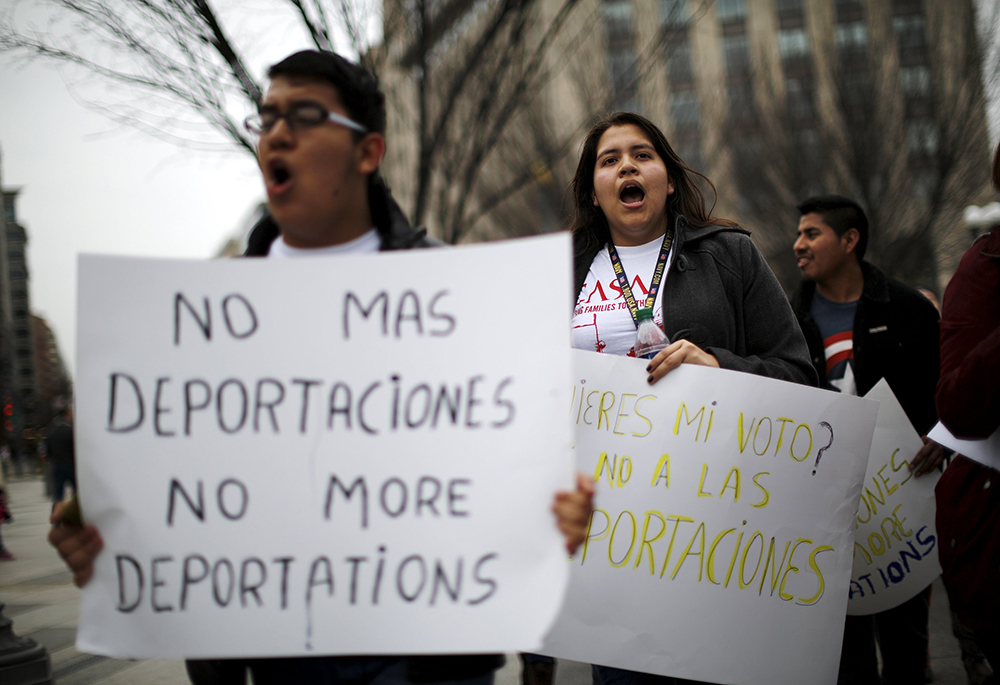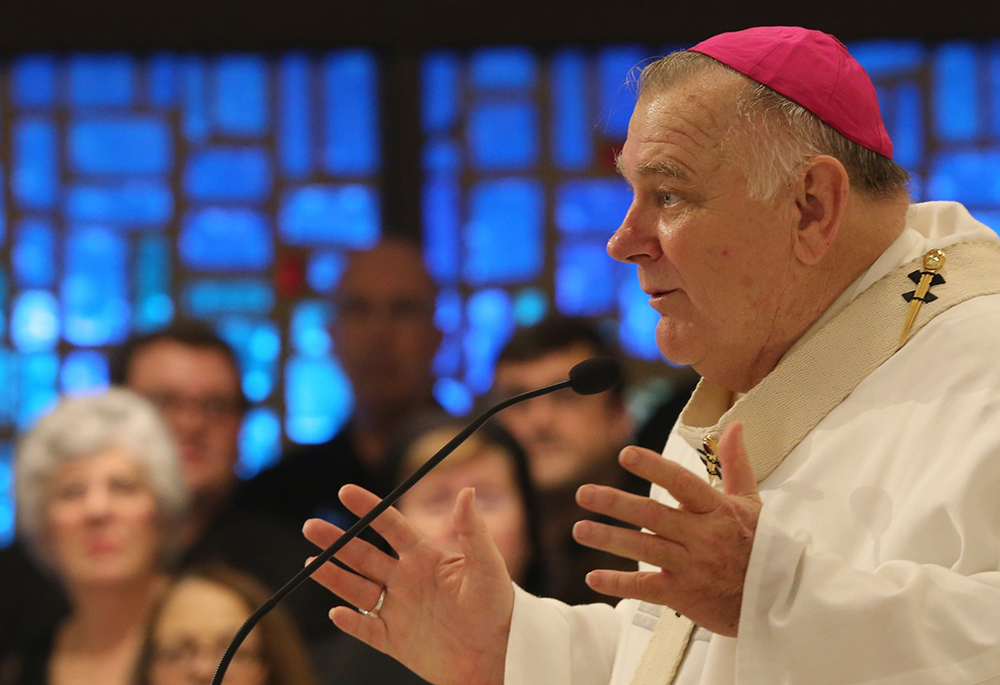
Delegates holds "Mass deportation now!" signs on Day 3 of the Republican National Convention at the Fiserv Forum in Milwaukee on July 17. (OSV News/Reuters/Brian Snyder)
The Republican National Convention in July featured signs and T-shirts proclaiming "Mass Deportation Now!"
That message from Donald Trump's campaign remains unrelenting and has been featured in nearly every rally speech, including Oct. 27 at New York's Madison Square Garden, where U.S.-territory Puerto Rico was described by a warm-up comic as a floating island of garbage and Latinos in general were depicted as reckless procreators. The former president and Republican candidate has pledged a massive roundup of what he estimates to be up to 20 million undocumented immigrants, and JD Vance, Trump's running mate, recently told ABC News that the proposed deportation roundup would begin at 1 million.
Catholic immigrant advocates see the scenario of mass deportation as a nightmare that would force immigrants underground, causing family hardship and the breakdown of communities from border states such as California and Texas, as well as states like New York, where immigrants have been well-established.
While the rhetoric from Trump and his supporters is clear, just how these mass deportations would be put into practice during a second Trump administration remains fuzzy.
"Nobody knows what we're dealing with," said Bishop Nicholas DiMarzio, the retired bishop of Brooklyn, New York, and a longtime advocate for immigrants. Like other Catholic immigrant advocates, he disputes Trump's numbers, saying the number of undocumented immigrants is around 11 million based on the U.S. Census data.

Bishop Nicholas DiMarzio, retired bishop of the Diocese of Brooklyn, New York, is pictured in an undated photo. (OSV News/Courtesy DeSales Media Group)
When he led the Diocese of Brooklyn, DiMarzio recalled that on routine visits to immigrant parishes he would ask for a show of hands for those in the congregation who were undocumented. It was usual to see half the hands raised, providing anecdotal evidence that undocumented immigrants have deep roots in urban communities. And, he said, according to a report compiled this fall by the Center for Migration Studies, a New York-based Catholic agency where he serves as chairman of the board, nearly half of undocumented immigrants live in families with U.S. citizens.
"It's a horrible situation," he told the National Catholic Reporter, saying the U.S.-citizen children "will bear the brunt of this. You will be dealing with family separation."
Mario Russell, the center's executive director, warned the campaign rhetoric is not just political red meat.
"It needs to be taken seriously," he said, noting Trump's rhetoric is backed by a first-term record that included the infamous separating of migrant children from their families, many of whom have never been located. "It is clearly a priority issue for them," he said, with much of the planning for mass deportations outlined in Project 2025, a blueprint for a Republican administration contributed to by former Trump advisers or administration members, but disavowed by the campaign. Stephen Miller, Trump's former top adviser, has said that mass deportation would call upon the resources of federal authorities as well as state police and the National Guard.
'You will be dealing with family separation.'
—Bishop Nicholas DiMarzio, retired bishop of Brooklyn, on the Trump campaign's deportation plans
Even sanctuary cities would not be able to overrule a massive National Guard mobilization and federal sweep of workplaces, said Russell. Churches would likely be spared direct raids, acceding to current federal regulations and some state laws, including New York's. But immigrant churchgoers may well be pushed underground because of fear, unwilling to venture in public.
Key findings of the Center for Migration Studies report include:
- 5.8 million U.S. households are home to at least one undocumented resident;
- Over half of the U.S. undocumented population have been in the country for at least 10 years;
- 5.5 million U.S.-born children live in households with at least one undocumented resident;
- The cost of paying to complete the upbringing of these U.S.-born children in the event of mass deportation is estimated to be at least $116.5 billion;
- Taxes paid by undocumented workers — an estimated $96.7 billion — if they were removed from the workforce would have a substantial impact on local economies;
- Mortgages now being paid by undocumented immigrants would be left unpaid, and could create a crisis in the housing market.
Some say Trump has signaled a willingness to change positions. During an interview with The Wall Street Journal editorial board, Trump said he may not deport law-abiding undocumented immigrants in his second term.

Demonstrators call for an end to deportations in a protest outside the White House in Washington in 2016. (CNS/Reuters/Carlos Barria)
"Trump deals with hyperbole," said Archbishop Thomas Wenski of Miami, who spent decades ministering to Haitian refugees and has seen the ebb and flow of how American politics responds to immigration, including the Reagan administration's action in the 1980s to intercept and turn away ships suspected to be carrying undocumented Haitian migrants.
He said the Haitian refugees were largely victimized because they had no domestic political base to champion them. That is not the situation for many of today's immigrants, he said, particularly with both parties vying for the Latino vote. Mass deportation would also work against Trump's pledges to cut inflation and boost the economy, as experts predict that forcing undocumented immigrants to leave would weaken agriculture, dairy and other critical sectors.
Wenski said there is a long-term accommodation to immigrants, at least in South Florida, home to large immigrant communities and an economy where there is low unemployment.
"Here there is no pushback. Here it is a reality and we are living with it. There are still signs that say 'Help Wanted,' " he told NCR. "I am trying to be hopeful. Hope is a theological virtue."

Archbishop Thomas Wenski of Miami is pictured on June 13, 2018, during the U.S. Conference of Catholic Bishops' annual spring assembly in Fort Lauderdale. (OSV News/Bob Roller, CNS file)
DiMarzio said even if it is just political rhetoric, the anti-immigrant tone has an impact. He met a Haitian woman outside a church in Brooklyn in tears after hearing Trump's false comments during the debate with Vice President Kamala Harris about Haitian immigrants in Ohio eating cats and dogs. "The lies hurt," said DiMarzio.
The U.S. bishops have long pushed for comprehensive immigration reform that would legalize many of the undocumented. For DiMarzio, a crackdown on employers would provide an incentive for migrants seeking work to stay in their home countries with provisions allowed for those seeking political asylum.
"The problem is not at the border. The problem is at the workplace," he said.
Wenski said that provisions in the immigration code that allow immigrants who came to the U.S. before 1973 to earn legal status should be extended and could be done by Congress simply updating existing law.
He said that while the U.S. bishops are often viewed as divided by liturgical and church governance issues, there is unanimity in their support for immigrants.
Advertisement
But while that teaching on immigration is well known in immigrant parishes, it's not so strongly emphasized in more established parish communities, said DiMarzio. Few Catholics of European ancestry realize the uneven history of immigration, noted DiMarzio, who wrote a doctoral thesis on the subject. He has extensively studied the 1924 law that significantly limited Italians and Eastern Europeans from entering the country, largely seen as racist and anti-Catholic, which restricted immigration until changes in the law in the 1960s.
Trump often refers to the massive deportations of Mexican farmworkers during the Eisenhower administration as a possible model. That deportation resulted in both Mexicans and U.S. citizens getting deported, according to historians.
The former president's rhetoric is often infused with a gushing nostalgia promoting a longing for an America that once was. Still, those convention signs and T-shirts promise dire consequences, said DiMarzio.
"History is repeating itself. We are going back to the same problem," he said.







